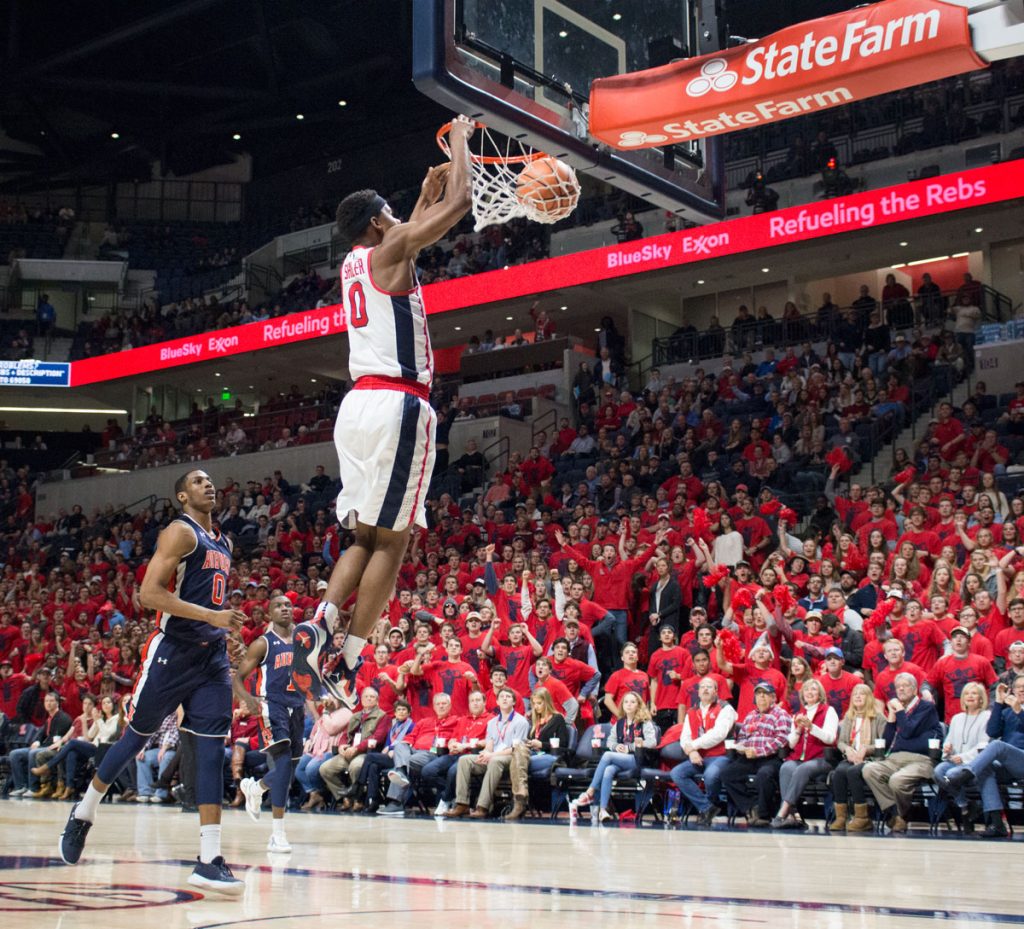Since Mike Harris joined the university as director of the Department of Parking and Transportation in February 2014, the numbers of citations for offenses like parking and obstructing traffic have decreased.
There were 46,356 total citations from July 2014 to June 2015 and 52,764 from July 2015 to June 2016. In the previous school year from July 2016 to June 2017, there were 39,689 citations and 6,299 of those were warnings. To date this school year, since July 2017, there have been 24,398 citations, 3,950 of which were warnings.
Harris said the parking warning system began during his time as director.
“We write warnings that first week or so of classes so that people kind of get used to where they’re parking,” Harris said.
After working in parking for 24 years, Harris said citation numbers at a university the size of UM should be in the 35,000 range.
Harris said when he first arrived, he and the department wanted to clear up parking confusions. To correct striping confusions, they created red-painted curb lines around fire hydrants to bring attention to not park there, and each summer, they restripe all the parking lots to avoid faded lines. They’ve worked to improve signage across campus parking lots, ensuring signs dictate whether lots are for faculty and staff or for students.
“A lot of that has helped reduce those citations because it makes it a lot clearer to the parker what they should and shouldn’t do,” he said.
Additionally, Harris said the department has implemented a change in handling first offenses. If it is a student’s first non-serious offense (excluding parking in a handicap spot, in front of a fire hydrant or obstructing traffic), the department voids the citation if the student visits it to discuss the ticket in hopes of correcting the behavior. For example, if a student with a commuter pass parks in a faculty/staff lot, which is considered out of zone, that first offense would be voided.
“We’re trying to give folks an opportunity to do the right thing,” Harris said. “Obviously after that, you’ve had a warning, and maybe you’ve gotten that first citation; if you haven’t took those things to heart and you do it again, then obviously, you’re going to get another citation.”
To Harris, though, parking tickets are inevitable. In fact, parking citations rake in $1.3 to $1.6 million a year, but despite how large that number is, the money is not much when compared to the number of people coming to campus. Harris said that they not only count students, faculty and staff in this figure but also visitors, vendors and construction workers.
“You know, we’ll have 100,000 people out here for a ball game,” he said. “When you start thinking in terms of everything, it’s not that bad.”
Isaiah Crockett, a visitor of the university, said he accumulated three to four tickets after visiting his girlfriend, Alexis Neely, a student at the university.
“I mean, I was in the wrong,” Crockett said. “So, I can’t really complain about it.”
Regarding the revenue brought in by visitor citations, Harris said that number still isn’t a lot. For instance, the first violation for no decal is $50 but increases to $100 on the second violation, whereas an overtime ticket at a meter is $25. All ticket prices can be found on the university’s website.
As the Department of Parking and Transportation is an auxiliary, it doesn’t receive any money from the school or state. Therefore, the department’s revenue comes from citations ($1.3 to $1.6 million), permits ($4.1 million), meters ($120,700), the bike shop ($15,000) and departmental transfer ($131,500). Permits alone account for almost 70 percent of that revenue and citations a little over 25 percent.
On the expense side, the department pays $2.3 million to debt services, which is currently paying the bills that built The Pavilion and residential garages. In transportation, they pay $1.6 million to run OUT buses so that students ride free of charge.
“We are not like most universities,” Harris said. “They have what’s called a transportation fee that all students pay, and that transportation fee pays for their transportation.”
Outside of debt services and transportation, the department spends more than $1 million on operations or salaries, wages, benefits, costs of printing and mailing permits and equipment. For maintenance, there is $400,000 in the budget. Lastly, there is a $472,000 fee for deferred maintenance, or a “rainy-day fund.”
“Deferred maintenance is an account that we put money in every year to pay for large expenditures that will be coming up over the next four, eight, 10 years,” Harris said.
This account benefited the university during the construction of the $32 million residential garage. Harris said the school didn’t have to borrow as much money because they used funds from the deferred maintenance account. Furthermore, the department won’t have to pay back as much to debt services.
Both the revenue and expense balance out and equal $5.8 million, but when values, like citations, fluctuate, the department may not be able to put as much into expense areas, like the deferred maintenance account.
“We are really, really trying to do all we can with the amount of funding that we have,” Harris said. “The numbers reflect what we’re doing. I think parking has gotten better over the last few years. Hopefully, it will continue to get better, and we’re going to do all we can to make it continue to do so.”
Besides enforcement, citations provide safety to the university community. While the parking enforcement officers issue parking-related tickets, the University Police Department issues moving violations, like speeding fines, running stop signs and failure-to-yield citations, to maintain order on campus, UPD Assistant Chief Ray Hawkins said.
With the majority of citations being for speeding and running stop signs, Hawkins said the revenue isn’t a lot, yet it varies based on officer shifts, the semester and time of year as well as the activity of the officer and violator.
UPD issued 551 citations with a fine total of $31,700 in fiscal year 2015, 1,145 tickets at a $61,600 total in fiscal year 2016 and 491 tickets for a $28,150 fine total in fiscal year 2017. So far in this fiscal year, there have been 197 citations with a fine total of $10,375.
Those funds directly benefit the police department with equipment, programing and training.
Even though UPD typically handles moving violations, it often will issue parking citations once the parking and transportation department closes. Although people don’t need a permit after 5 p.m., people often park illegally, so UPD would have to issue parking tickets for obstructing traffic or parking in no parking or tow-away zones.
“Even though we don’t necessarily oversee parking anymore, there’s still a role we have to play in what they do: the enforcement of parking rules and regulations,” Hawkins said.











